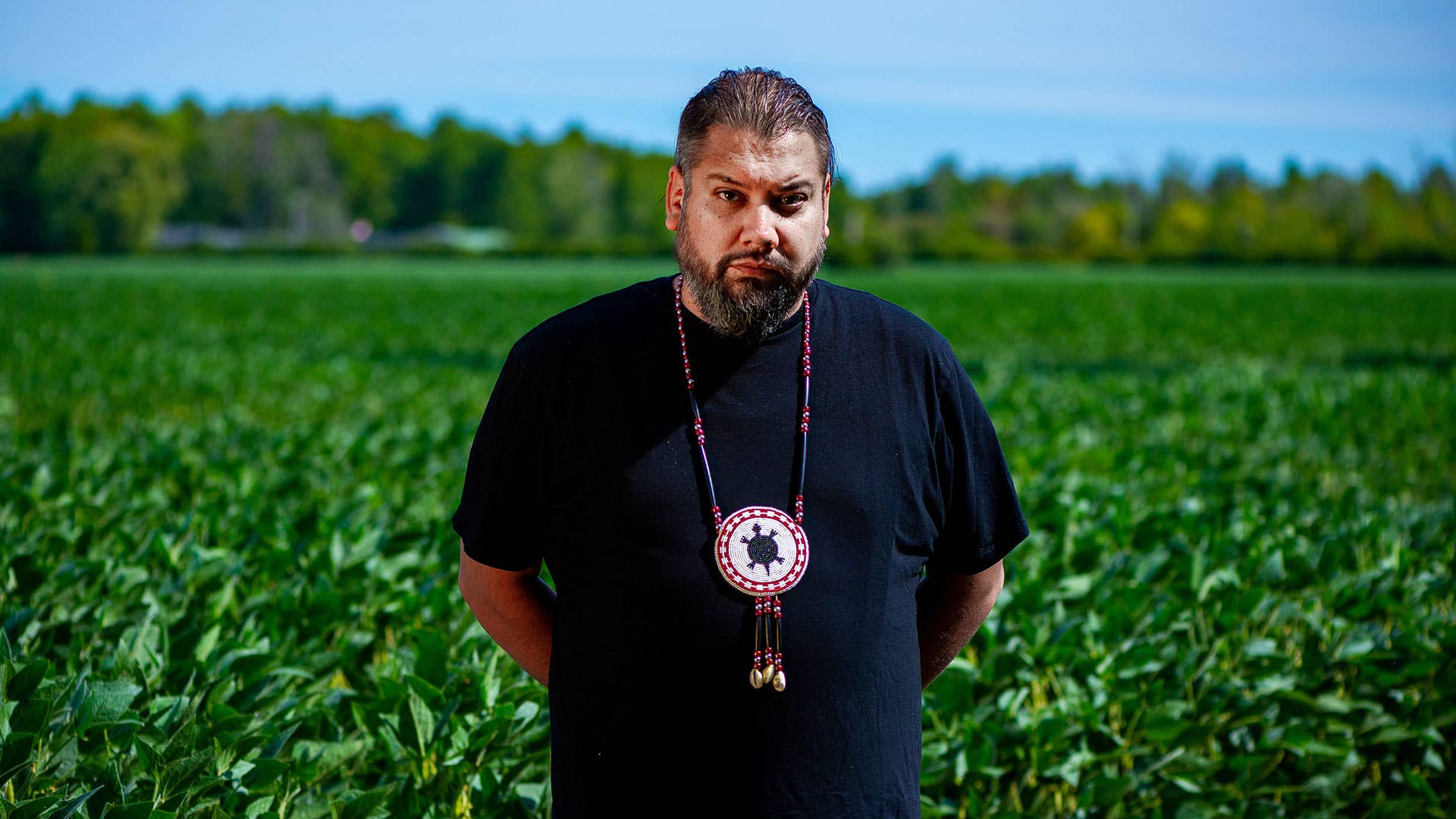
Yes, DJ Shub’s new album War Club abounds with enough pulse-pounding Canadian Indigenous drumming and spine-chilling traditional chants to satisfy fans of the powwow-step genre he helped pioneer. However, those long-time listeners of his Juno-winning work in A Tribe Called Red will be surprised by what else they hear on the Mohawk tribe member’s latest LP. Take key track “Calling All Dancers,” which mixes powwow-step with dancehall. “Killa Soundboy” is laced with Latin rhythms thanks to a guest turn from Canadian-Mexican singer Boogat. “Pow Wow Dub” lives up to its name, meanwhile, thanks to a smattering of dubstep among its Indigenous chants.
Then there’s “The Social.” On it, rising Toronto MC Phoenix Pagliacci (of The Sorority fame) finds lyrical common ground between Canada's myriad missing and murdered Indigenous women and the Black Lives Matter movement. During a recent interview on the heels of War Club’s December release, DJ Shub (born Dan General) tells Complex how “The Social” rapidly evolved from an instrumental inspired by a specific Indigenous tradition into a multi-national, socially-conscious anthem. Its initial sonic muse was the regular gatherings called socials, for which those in Shub’s Mohawk tribe meet, assess their lives, and offer each other support where needed. He says: “That’s where it stopped for me. But when I asked Phoenix to jump on, she took my points and ran with them.”
“She made ‘The Social’ not only accessible to native communities, but everyone,” Shub adds. Through their collaboration, the universality of the song and the storied tradition that inspired it became clear, according to Shub. As he puts it: “We need to check in with the rest of our community regularly, to make sure everyone is doing better.” “The Social” and the album’s other genre forays help bring the world to the reservation, as it were. All that is a natural progression for Shub from his prior producing and DJing, both solo and with A Tribe Called Red. That earlier work put the authentic music that Shub grew up with on the Six Nations of the Grand River (Canada’s largest reservation) on the map nationally and beyond, while also garnering Tribe critical acclaim, major festival spots, and more.
DJ Shub told us more about remaining true to his Mohawk roots while also chafing against the label of “Indigenous artist,” the time-honored origin of his new album’s title, confronting his personal demons with War Club’s songs, and more. Check out the premiere of the music video for the album's title track, featuring Snotty Nose Rez Kids, and read our chat below.
When did you realize your music was a weapon worthy of the War Club title?
It goes back to music always being there, and me using it as a tool. It has gotten me out of situations, and helped me get frustrations out. If someone was talking smack, it was better not to use violence but to channel that frustration into the music. Back in the day, a war club was a traditional weapon that my Mohawk tribe used to right wrongs. So for me now, I use music to right my wrongs and get through hard times. I see it as my weapon against anything negative.
This is something I always knew, but it became clearer and clearer as I was making this album. Through that time I was battling addition. Now I’m two years sober. All the goodness that has come to me since then was through my family and my music.
That’s interesting, because many lyrics on this album aren’t so much introspective, but instead look at broader societal issues, wouldn’t you say? I’m especially thinking of Snotty Nose Rez Kids' lines about colonialism and police brutality on the title track. Or Phoenix’s rhymes about Black Lives Matter and missing and murdered Indigenous women on “The Social."
The album grew because of those collaborators. They helped shape it, which humbled and helped me greatly. Phoenix brought together Indigenous issues and Black Lives Matter. She saw the similarities in our struggles.
For Snotty Nose Rez Kids: I had made three or four beats for them, and we actually ended up combining three tracks into one. And what they did to that song was fire. It’s great to be working with them, because they’re blowing up like crazy. The most important thing is being original, because you don't get far copying. That, along with being a voice for a huge community, a community that they carry on their back, all put Snotty Nose Rez Kids on an entirely different level. They remember where they’re from [Kitimat, British Columbia] and they always remember to be real.
"Melding cultures is a beautiful thing. Culture is a beautiful thing, especially Indigenous culture, and I think it’s worth spreading."
Aside from up-and-coming Indigenous artists like Snotty Nose Rez Kids and established vets like Cree MC Hellnback and Apache funk guitarist Stevie Salas, War Club also features contributions from Latin and dubstep artists, among others. Was this your way of shaking off the label of “Indigenous artist” that you’ve described as limiting in prior interviews?
This music is made for anyone who is looking for an escape from the norm. I didn’t want to be pigeonholed. Expanding on different genres, surrounding myself with Indigenous, Latinm and hip-hop music—it’s freeing in a way. It’s not music for Indigenous people specifically. It’s made for everyone. I hope people who’ve never heard of powwow-step will enjoy it, in the same way that some Indigenous people that never heard of jungle dubstep will like [some of War Club’s songs] like “Pow Wow Dub.”
Melding cultures is a beautiful thing. Culture is a beautiful thing, especially Indigenous culture, and I think it’s worth spreading. There are people who don’t want to spread the culture, who want to keep it as theirs, so there are certain songs I don’t touch because of that, and that’s ok. But this album is yours to explore.
What do you mean by there are “songs I don’t touch?”
Powwow-step is in its infancy. It’s only been around 10-12 years, compared to other genres. In the very beginning, A Tribe Called Red and I were navigating it without a flashlight. I’d get feedback from traditionalists when I first started, who told me the music was great. But then they’d explain that some of the Indigenous songs I was sampling had specific purposes and were not meant for everybody. I get that, and stay away when I should. Because I’m not trying to exploit—I’m trying to use and share.
How does your music and creative process now compare to when you were in A Tribe Called Red?
Since Tribe my music has evolved. I’ve learned so much since the beginning. I’ve been coined "the godfather of powwow-step," and hold that in high regard. Because this is my calling.
How do you create powwow-step songs, and honour those traditions? Are you sampling recordings of powwows? Or is the drumming recorded live, before you modify it?
Sometimes it’ll be live. Other times, I’ll hear something on a recorded traditional song and realize it will be a great sample, before chopping it up and adding drums. Or I’ll have an idea and share with singer friends, before laying it down.
It wasn’t until I joined A Tribe Called Red that I really saw how to merge traditional music with contemporary electronica and hip-hop. I had started as a hip-hop producer, but powwow-step felt totally different because it was my music, part of my culture. It was awesome to create something for Indigenous people that we could call our own. It’s not strictly for us though, which shocked me—being accepted by non-Indigenous and Indigenous, I didn’t know it could be done. Once I got people of all colours dancing, it was a fantastic feeling. Hopefully the pandemic improves soon, and we can get back to normal and have fun and dance again.



